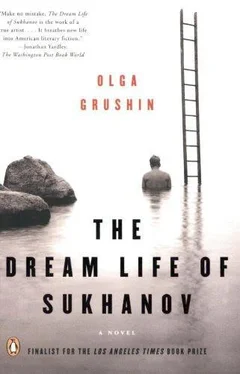It happened in the spring of 1937, some three months after Pavel Sukhanov had left Moscow. The mystery enveloping his father’s job had lifted from young Anatoly’s mind one day shortly after his eighth birthday. On that January day, when the whole world was particularly white and cold and every word seemed to hang in the air a bit longer, as if frozen, his smiling but curiously red-eyed mother sat him down and explained that a new factory near Gorky needed the help of a talented engineer with an unparalleled knowledge of building airplanes. It would only be for a little while, she said; and even though his eyes glistened, he nodded with the seriousness of an adult and felt proud of his father’s importance to the country.
But after his father had gone, with a handshake so strong that for days afterward he could recall its grip in his fingers, things started to change—imperceptibly at first, then faster. Nadezhda Sukhanova now wandered through life without animation, leaving dirty plates in the sink and forgetting to turn off the lights in the shared bathroom, and Anatoly’s school days, with no one to ask about them, chased one another into bleak oblivion. Then gradually, as the winter melted into spring and his evenings were slowly drained of all hope of his father’s speedy return, the presence of the Morozovs began to make itself felt in the rambling six-room apartment. The head of the family, Anton Morozov, a burly thirty-three-year-old man with hairy arms and a face resembling a slab of beef, left obnoxious cigarette stubs in the music teacher’s teacups, and was once heard to inquire in a conspicuously loud voice, his eyes narrowed shrewdly, why the old couple who sat at the Sukhanovs’ table were occupying two rooms between them when one would suffice just as well. Morozov’s sister Pelageya, when hanging lines of stockings and camisoles to dry, took to casually usurping the other half of the kitchen, and a few times at supper, his wife, Galka, sharply berated the nervously perspiring Zoya Vienberg for the weekly singing lessons she gave, threatening to complain to the authorities about the noise.
In late March, when the icicles started to break off the roofs, smashing onto the pavement below with precise crystal explosions, and there was still no sign of Pavel Sukhanov, the Morozov boys seemed to notice Anatoly’s existence for the first time. The younger of the two viciously tripped him in the hallway and, as he sat up, surprised and hurt, hugging his scraped knee, snickered coldly and told him to run and cry in his mother’s lap; and a week later, the older boy got hold of a nice red notebook in which Anatoly had been laboriously drawing the unsteady round letters of his homework and, grinning with pleasure, fed it page by page into a trash chute before Anatoly’s eyes. Their shouting and guffawing disturbed him almost nightly, populating his dreams with wide-mouthed, red-faced, thick-armed, terrifying bullies. And when one day the two cornered him in the yard and, nudging each other, told him about the old man’s manuscript, it was in the hope of shaking off his nightmares, of showing them that he was not to be ridiculed—that, indeed, he could be one of them—that Anatoly swallowed and, his eyes bright, said quickly, “Sure, I’ll do it.”
In spite of seeing him and his blue-haired wife daily at the kitchen table, I knew almost nothing about the old man. His name was Gradsky; he seemed to be in his late sixties; his hands were delicate, frail, and yellow, like ancient papyrus. Anton Morozov derisively called him “the Professor.” Apart from quiet greetings spoken into his meticulously trimmed beard, he said very little, and I never heard him talk about himself, but the Morozov boys claimed to have found out quite a bit about him—including the interesting fact that every night, after his wife retired to the neighboring bedroom, the light continued to seep out for hours from underneath the door to his tiny study. Once, when the door had stood briefly ajar, they had caught a glimpse of him dozing over a thick stack of papers on his desk. He was writing some book, they said to me; they had overheard him referring to it as the work of his life. If I returned successful from my mission, they told me smiling, they would fold the pages into boats and set them traveling with the merry blue waters of melting April snows down the widest streets of Moscow.
“Great,” I said to them, my throat dry.
That night my soul wept with loneliness as I lay awake, adapting my shallow, anxious breathing to my mother’s measured breaths and delaying, delaying for as long as I could. When the predawn dampness crept in through the cracks in the windowpanes, I rose and tiptoed barefoot along the creaking corridor. The stillness rippled with the great whistling snores of Anton Morozov. No light marked the thresholds. When I reached the next-to-last door, I stopped and hesitated, feeling all the while the expectant malice of the Morozov boys at my back, thinking especially of the slanting eyes and the slow grin of Sashka, the older one. Then the cuckoo, sounding peevish, announced four o‘clock from its perch in the kitchen, and, my heart leaping wildly through my rib cage, I pushed the door open. As I stole in, the hinges issued a sharp little squeak.
If I had ever entered Gradsky’s study before, I had been too young to remember. The darkness, suffused with a pale gray light falling through the narrow rectangle of the room’s solitary window, rarefied here and condensed there into deeper pockets of shade in patterns unfamiliar to me. I guessed at a bookcase, a desk, the silhouette of a stocky lamp. Navigating stealthily around invisible edges, I crossed the room to the desk, groped for the lamp’s cord, and pulled. A green-shaded light flooded the world, immediately blinding me, but after a few blinks I saw the peeling wood surface strewn with stacks of paper covered in neat, minuscule handwriting—and an instant later, something else, which made my heart shoot up into my throat. I had, of course, expected the study to be empty, but there, in an armchair in the corner, a man in a heavy robe sat hunched over, a notebook reposing on his knee. For one wild, panic-filled second, I imagined myself gathering the scattered pages, then dashing, his cries ignored, through the slumbering apartment to the safety of my room, and once there, tearing open the windows and throwing the whole armload of papers into the fading night, to watch them twirl like hundreds of white birds against the brightening skies and then slowly flutter down, down, from the fifth floor to the yard below, to the torrents of melting snows that would wash them away forever…. But in another erratic heartbeat I remembered the heavy tape that still ran around the windowpanes, binding them shut to keep out the winter drafts, and my thoughts darted in confusion—and already the old man in the armchair was stirring, lifting his head, revealing his neat silver beard, his flashing glasses…. Squinting with surprise, he regarded me in silence. I stood before him, lost and frightened, thinking of the hurt expression that would settle on my mother’s face when she found out what I had tried to do. Then, unexpectedly, he smiled.
“Oh, it’s you, Tolya,” he said. “Can’t sleep, can you? Well, in truth, neither can I. I was just resting my eyes. Nice of you to visit me.”
I remembered the respectful words my father had always found for him, and grew suddenly ashamed of myself. At the same time I disliked the old man intensely, both for the feeling that rose in me and for the kindness with which he spoke; and the strangeness of his room, which I now saw clearly for the first time, made me feel uneasy. It was small and stuffy, this room, with a disproportionately high ceiling and an unusual smell of leather, mold, and dust permeating the air; and although its scanty furnishings were no different from any others in the apartment, many disturbingly foreign things caught my eye. There were towers of books on the floor, the volumes thick and brown and etched, unlike any I had ever seen at the school library, and more books with gilded spines organized in grave processions behind the glass doors of a bookcase; a magazine lying on the desk, its cover bearing a long-haired woman with a fantastically coiled fishtail and glittering with golden letters, some familiar and others odd and curly-looking; a round convex glass that made a few words on the page beneath it swim up to its surface enlarged and distorted; and next to it, strangest of all, a small transparent dome whose depths blossomed with multitudes of tiny flowers, white, crimson, and purple, their artificial petals so delicate, so lovely…
Читать дальше








![Theresa Cheung - The Dream Dictionary from A to Z [Revised edition] - The Ultimate A–Z to Interpret the Secrets of Your Dreams](/books/692092/theresa-cheung-the-dream-dictionary-from-a-to-z-r-thumb.webp)



